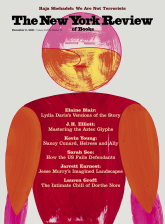In response to:
The Glories of Aksum from the October 7, 2021 issue
To the Editors:
In “The Glories of Aksum” [NYR, October 7], Peter Brown quotes Edward Gibbon’s dictum, in chapter 47 of the Decline and Fall of the Roman Empire, that medieval Ethiopia “slept near a thousand years, forgetful of the world, by whom they were forgotten.” This he condemns as a specimen of the Eurocentricity that has condemned us to see the history of early Christianity in exclusively Greco-Roman terms. There is, of course, much truth in this, but something may be added to what he says. In chapter 42, Gibbon presents Aksum as the western terminal of an oceanic silk road, running from south China through the Indian Ocean to the markets of Persia and Byzantium. Gibbon thinks that if a Christian power had been established on both coasts of the Red Sea, the growth of Islam might have been prevented.
The main theme of chapter 47, however, is the great schism between Greco-Roman Christianity and those of Syria, Egypt, and Ethiopia, which makes the conquests of Islam possible. The latter, however, do not extend to Ethiopia and the thousand years of isolation of which Gibbon speaks—no doubt with exaggeration—are as much a separation from Islam as from Christendom. They are briefly interrupted by the Portuguese circumnavigation of Africa, which leads in the sixteenth century to a Jesuit intervention in Ethiopian affairs, frustrated by historic power both spiritual and secular.
Here Gibbon ends chapter 47 of his fourth volume with the words “the gates of that solitary realm were forever shut against the arts, the science, and the fanaticism of Europe.” This was of course his subject, but he did not think it the only force operative in world history.
J.G.A. Pocock
Baltimore, Maryland
This Issue
December 2, 2021
Grand Illusion
‘And I One of Them’
Herring-Gray Skies



